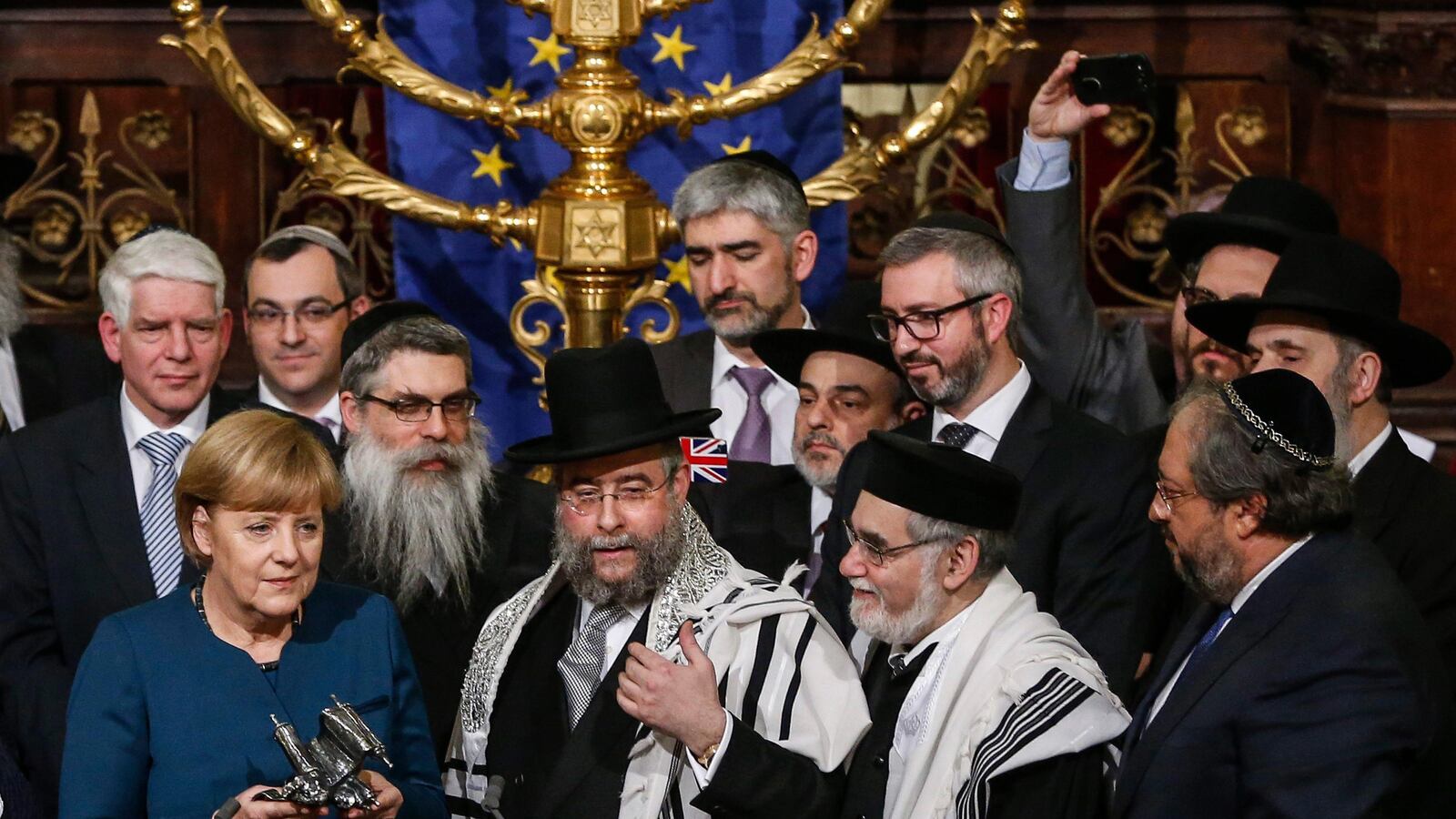Polarizing Republican presidential nominee Donald Trump has spent the better part of his (ongoing) campaign spewing blunt-force vitriol at all manner of minorities, be they Muslims, women, or Mexicans, as most recently seen with his xenophobic attacks on the federal judge, Gonzalo Curiel, presiding over his Trump University lawsuit. In doing so, the demagogue—whose father’s side, under the name “Drumpf,” hail from the tiny wine village of Kallstadt in Germany—has attracted white nationalist supporters, some of whom harbor a fetish for anti-Semitic internet memes. All of this makes The Donald perhaps the ideal audience for Germans & Jews, a new documentary from Janina Quint that asks the question: How do individuals, and societies as a whole, reckon with a history of intolerance?
This is not to forward a specious equivalency between Trump and Hitler (as some have previously done). Rather, it’s to suggest that the NYC real estate mogul-turned-politician would benefit from listening to the thoughtful means by which Quint’s subjects try to process the 21st century’s greatest case of genocidal prejudice: the Holocaust. That tragedy is investigated, and discussed, with a degree of reflective maturity that’s so far evaded the Republican nominee, whose habit of saying whatever vile thing comes to mind—and then, as earlier this week, claiming that such maliciousness was merely “misconstrued”—is wholly at odds with the Germans and Jews featured in Quint’s film, who through astute comments shine an illuminating light on the way in which communities cope with a heritage steeped in hate.
Though running a fleet 76 minutes, Germans & Jews proves a well-rounded micro snapshot of post-WWII Germany. According to Quint’s film, the specter of National Socialism continues to loom far and wide over the landscape and its inhabitants, who now—somewhat stunningly—include nearly 200,000 Jewish residents in Berlin alone. That Jews are increasingly emigrating to Germany speaks volumes about the efforts made by the German people to honestly and forthrightly confront what they (and their ancestors) did. Although as the documentary makes clear, the path to this present state has been anything but easy.

Through conversations with citizens, artists, scholars and more, Germans & Jews provides first-hand accounts of what it’s felt like to be German since the fall of Hitler’s Nazi regime. The answer, as it turns out, is complicated—both for those who grew up immediately after the war’s end and had to grapple with the revelation that their beloved parents had played a part in unthinkable Holocaust atrocities, and for those who were born in the ensuing decades and felt great (if somewhat more abstract) blame for their nation’s indefensible mass-slaughter actions. In candid and revealing recollections, the film’s German men and women articulate the internal confusion wrought by their post-WWII circumstances in a nation where responsibility, remorse, anger, and shame all coexisted in an uneasy stew, and where attempts to directly confront the Holocaust (as with the broadcast of a 1979 miniseries that riveted all of West Germany) further muddied Germans’ sense of identity, which was torn between feeling at once connected to, and repulsed by, their homeland.
Despite addressing the multilayered emotions of Germans existing in Hitler’s shadow, Germans & Jews is far from an apologia; instead, it proves a level-headed, borderline-detached stab at understanding how Germans, and by extension Germany as a whole, dealt with a still-fresh history of mass extermination and attempted world conquest. As it turns out, they did so in a variety of ways, including decorating towns and cities with memorials that were specifically designed to be unpleasant, unavoidable reminders of what their forefathers had done in WWII. And somewhat unsurprisingly, the country’s efforts to own up to, internalize, and atone for its sins was made more difficult by the fall of the Berlin Wall, given that by 1989, East Germany felt that it had already transcended the Holocaust, while West Germany—where WWII was the most heavily taught subject in schools, and where monuments were pervasive (including street sign placards detailing the region’s 1930s and 1940s anti-Semitic laws)—had a cultural consciousness dominated by guilt and disgrace.
Germans & Jews thus provides a revealing window into a post-WWII German psychology fraught with contradictions—although the film’s purview extends to Jews both living in and outside Germany. Like their non-Jewish German counterparts, these individuals struggle with upbringings in which they were taught (while living in Germany, America or Israel) to not trust Germans, since they were “all Nazis.” However, due to a number of different social, economic and professional reasons, many Jews have returned to Germany over the course of the past fifty years. Their experiences have ranged from the predictably uncomfortable (one man talks about the quiet, but ever-present, anti-Semitism he felt as a student in 1950s German schools) to the surprisingly accepting, peaking with an artist exclaiming that—despite the admitted presence of neo-Nazis in some regions—he believes Berlin is, today, a safer place for Jews to live than Israel.
Director Quint doesn’t challenge such opinions—which are heard in standard talking-head interviews, as well as during a staged dinner between many German Jews and non-Jews—so much as she allows differing viewpoints to co-exist side-by-side. Employing a conventional Ken Burns-ian non-fiction aesthetic, in which straightforward chats are interspersed with archival photographs (that the camera pans and zooms about), Germans & Jews stays out of its own way, allowing its many voices to evoke the twisted, alternately contradictory and complementary feelings and thoughts that define German-Jewish dynamics. The result is a panorama of perspectives on a thorny and ever-changing paradigm—one that, as one speaker notes, even involves “philosemitism,” the effusive admiration of Jews and Judaism that, in its most extreme form, can potentially veer close to traditional anti-Semitic stereotypes (i.e. the admiring “Jews are great with numbers” becomes the loathsome “Jews are manipulative, greedy shysters”).
In respectfully detailing the intricacies of identity formation and redefinition in an increasingly diverse 21st century, Germans & Jews is not simply a depiction of considerate intercultural dialogue, but an example of it as well. Our discord-sowing Republican presidential nominee, could learn a thing or two from it.






